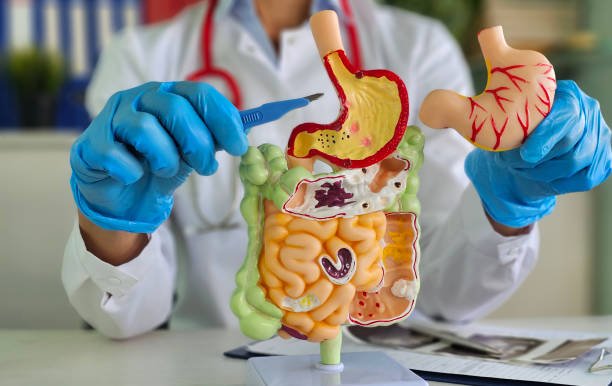We envision a world where everyone has the tools and knowledge to live a balanced, healthy, and fulfilling life. By providing reliable resources, personalized programs, and community support, we aim to be a beacon of hope for those on their health journey.
Table of Contents
Understanding Gut Health

how to improve gut health
Gut health plays a pivotal role in maintaining overall well-being and is integral to various bodily functions, including digestion and immunity. The gut, often referred to as the gastrointestinal tract, comprises a complex system that begins in the mouth and extends to the anus. This system is responsible for processing food, absorbing nutrients, and eliminating waste. Detox Your Gut; However, its significance stretches far beyond mere digestion; a healthy gut is essential for maintaining optimal health and preventing various diseases.
At the core of gut health is the gut microbiome, which consists of trillions of microorganisms, including bacteria, viruses, and fungi. These microorganisms can significantly influence health and well-being. A balanced gut microbiome, characterized by a diverse array of beneficial bacteria, aids in digestion, synthesizes vitamins, and supports the immune system. Conversely, an imbalance between good and bad bacteria can lead to a condition known as dysbiosis, which has been linked to issues such as inflammatory bowel disease, obesity, diabetes, and even mental health disorders.
The connection between gut health and the immune system is particularly noteworthy. Approximately 70% of the body’s immune cells reside in the gut. This close relationship means that a thriving gut microbiome can enhance immunity, helping the body fend off illnesses and infections. Additionally, research has shown that gut health can impact mental health, with the gut-brain axis facilitating communication between the gut and the brain, influencing mood and cognition.
Therefore, understanding and prioritizing gut health is crucial. By fostering a diverse and balanced gut microbiome through dietary choices and lifestyle modifications, individuals can improve not only their digestive function but also their immunity and overall health, leading to long-lasting benefits for well-being.
Signs of Unhealthy Gut
A healthy gut is vital for overall well-being; thus, recognizing the signs of an unhealthy gut is crucial for timely intervention. One of the most common indications of poor gut health is digestive issues. Symptoms such as bloating, gas, diarrhea, constipation, and heartburn can signal an imbalance in gut bacteria or other gastrointestinal disturbances. Chronic digestive problems should not be ignored, as they might lead to more severe health issues over time.
Another significant sign is food intolerances or sensitivities. If an individual frequently experiences discomfort after consuming certain foods, it may indicate that the gut is struggling to digest those items properly. This discomfort can manifest as abdominal pain, cramping, or inflammatory responses, suggesting the presence of an unhealthy gut lining. Food intolerances, especially to common allergens like gluten or dairy, can often trace back to gut health issues.
Skin problems are also linked to gut health. Conditions such as eczema, acne, and rosacea may reflect underlying gut imbalances. The gut-skin axis suggests that when the gut microbiome is impaired, it can result in inflammation that manifests on the skin. Therefore, individuals dealing with persistent skin issues might benefit from evaluating their gut health.
Furthermore, fatigue can serve as a subtle indicator of gut distress. An unhealthy gut may negatively affect nutrient absorption, resulting in vitamin deficiencies that can lead to chronic tiredness. If you find yourself feeling unusually fatigued despite getting adequate rest, it might be time to assess your gut health as a potential factor. Other signs may include frequent infections, poor concentration, and mood disturbances, which are often interconnected and point towards the necessity of gut health improvement.
The Role of Diet in Gut Health

The gut health of an individual is profoundly influenced by dietary choices. A balanced diet can enhance the diversity and population of beneficial gut bacteria, while unhealthy eating habits may lead to dysbiosis, a microbial imbalance associated with various health issues. Consuming a variety of foods rich in nutrients ultimately plays a critical role in maintaining a healthy gut.
High-fiber foods are paramount for promoting gut health. These foods, such as whole grains, legumes, fruits, and vegetables, serve as nourishment for gut bacteria. Fiber stimulates the production of short-chain fatty acids, which have anti-inflammatory properties and help maintain gut barrier function. Additionally, fiber contributes to regular bowel movements, further promoting gut health and overall bodily function.
Prebiotics, a specific kind of dietary fiber, are particularly beneficial as they selectively feed healthy gut bacteria. Foods like garlic, onions, asparagus, and bananas are excellent sources of prebiotics. Incorporating these foods into your diet can significantly improve the microbial composition within the gut, enhancing digestion and immune function. Similarly, probiotics, which are live beneficial bacteria found in fermented foods such as yogurt, kefir, and sauerkraut, can also support gut health. Daily consumption of these foods helps to introduce new beneficial bacteria into the gut, thereby fortifying the existing microbiome.
Conversely, certain foods can adversely affect gut health. Processed foods high in sugar and unhealthy fats can contribute to the growth of harmful bacteria, leading to inflammation and other gastrointestinal issues. Limiting the intake of artificial sweeteners, alcohol, and refined carbohydrates can further support a balanced gut microbiota. Therefore, making informed dietary choices is essential for optimizing gut health and overall well-being.
Importance of Hydration
Hydration plays a pivotal role in maintaining optimal gut health, as it supports various physiological processes crucial for digestive well-being. Water constitutes a significant portion of the human body and is essential for the proper functioning of the gastrointestinal tract. Adequate water intake is vital for facilitating digestion, as it aids in breaking down food, which allows nutrients to be absorbed more effectively. When the body is well-hydrated, it produces sufficient saliva and digestive juices, both of which are critical in the digestive process.
Furthermore, hydration has a direct impact on gut motility. Water helps to soften stool and prevent constipation, ensuring smooth and efficient waste elimination. Insufficient water consumption can lead to dehydration, which may hinder bowel movement, resulting in discomfort and potential gut health issues. This underscores the importance of drinking enough fluids, particularly water, to foster an environment that promotes a healthy digestive system.
In addition to digestion, hydration also plays a role in maintaining the health of the gut microbiota. A well-hydrated body supports the mucosal lining of the intestines, creating an ideal environment for beneficial bacteria to thrive. These microorganisms are essential for digestion, immune function, and even mental health. Therefore, maintaining optimal hydration is critical for the balance of gut flora, which can significantly affect overall health.
To ensure sufficient hydration, it is recommended to drink at least eight 8-ounce glasses of water daily, commonly referred to as the “8×8 rule.” It is important to note that individual hydration needs may vary based on factors such as age, activity level, and climate. Incorporating water-rich foods, such as fruits and vegetables, can also contribute to overall fluid intake. Staying consistently hydrated can play a fundamental role in promoting gut health and, ultimately, overall well-being.
Incorporating Probiotics and Prebiotics

Maintaining gut health is paramount for overall well-being, and one of the most effective ways to achieve this is through the incorporation of probiotics and prebiotics into the diet. Probiotics are live microorganisms that can provide health benefits, particularly for the digestive system, by enhancing the composition of gut flora. They help to maintain a balanced microbiome and can aid in digestion, absorption of nutrients, and even enhance immune functions. Common sources of probiotics include fermented foods such as yogurt, kefir, sauerkraut, and kimchi. For those who find it challenging to consume these foods regularly, probiotic supplements are available and can be a practical alternative.
On the other hand, prebiotics serve as food for these beneficial bacteria. They are non-digestible fibers that promote the growth and activity of probiotics in the gut. Incorporating prebiotics into your diet can lead to improved gut health by stimulating the growth of beneficial bacteria, which in turn can enhance digestion and absorption. Foods rich in prebiotics include garlic, onions, bananas, asparagus, and barley. Including these foods in daily meals can substantially support a diverse and thriving gut microbiome.
To effectively integrate both probiotics and prebiotics into your diet, consider combining probiotic-rich foods with prebiotic sources during meals. For instance, adding sliced bananas to yogurt or garnishing a salad with raw onions can provide a balanced intake. Additionally, starting your day with a smoothie containing kefir and fiber-rich fruits can serve as an excellent way to nourish your gut health. Thus, the incorporation of these components in your dietary routine not only enhances gut function but can also lead to improved overall health.
The Impact of Stress on Gut Health
Stress has been identified as a significant factor influencing gut health. Numerous studies suggest that chronic stress can lead to a disruption of the gut microbiota, the diverse community of bacteria residing in the digestive tract. This imbalance can manifest in various digestive issues, including bloating, irritable bowel syndrome (IBS), and even inflammatory bowel diseases. When the body perceives stress, the autonomic nervous system may trigger a fight-or-flight response, which can adversely affect gut motility and secretion of digestive enzymes. Consequently, these physiological responses may contribute to an unhealthy gut environment.
The connection between stress and gut health can be explained by the gut-brain axis, a bidirectional communication system between the gut and brain. Research indicates that stress can alter the composition of gut microbiota, leading to dysbiosis, which is characterized by a reduced diversity of beneficial bacteria. On the other hand, a diverse microbiome supports not only digestive health but also overall well-being, underscoring the importance of managing stress for optimal gut function.
To mitigate the effects of stress on gut health, various practices have been established to encourage relaxation and resilience. Mindfulness techniques, such as meditation and deep breathing exercises, have been shown to help reduce stress levels effectively. By taking regular moments to focus on the present, individuals can cultivate a sense of calm that benefits both mental and gut health. Additionally, engaging in physical activities, such as yoga or aerobic exercise, can generate endorphins which are known to improve mood and alleviate stress responses. Incorporating these stress-reducing practices into daily routines can lead to improved gut health outcomes, making it essential for individuals to prioritize their mental well-being alongside physical health.
Regular Exercise and Its Benefits
Engaging in regular exercise is essential for maintaining overall health and well-being, particularly when it comes to improving gut health. Physical activity not only plays a vital role in promoting good digestion but also helps in maintaining a balanced gut microbiome, which is crucial for optimal bodily functions. Research has shown that various forms of exercise can positively influence gut health by enhancing gut motility, reducing inflammation, and promoting the growth of beneficial gut flora.
Aerobic exercises such as walking, running, cycling, and swimming are particularly effective in stimulating the digestive system. These activities increase blood flow, enhance the efficiency of nutrient absorption, and help in the smooth movement of food through the digestive tract. Additionally, consistent aerobic exercise has been linked to higher microbial diversity in the gut, which is associated with lower risks of gastrointestinal disorders and better overall health.
Moreover, strength training is another important aspect that contributes to gut health. Incorporating weightlifting or bodyweight exercises into your routine can lead to improved muscle mass, which helps in better metabolism and digestion. Studies indicate that individuals who participate in regular resistance training experience less digestive discomfort and improved gut health.
To promote gut health effectively, it is advisable to combine different types of workouts. For instance, integrating both aerobic activities and strength training can yield significant benefits. A well-rounded exercise regimen can include a mix of high-intensity interval training (HIIT), yoga, or pilates, as these variations not only improve physical fitness but also support mental health, indirectly benefiting gut microbiota.
Ultimately, prioritizing daily physical activity can lead to profound improvements in gut health. By committing to a regular exercise routine, individuals can enhance digestion, bolster their immune system, and cultivate a healthier, more balanced gut microbiome.
Sleep and Gut Health Relationship
The connection between sleep quality and gut health has garnered increasing attention in recent years. Research indicates that inadequate sleep may have a detrimental impact on the gut microbiome, which plays a crucial role in digestion, metabolism, and overall health. When individuals experience disrupted or insufficient sleep, alterations in gut bacteria composition can occur, leading to digestive issues such as bloating, diarrhea, or constipation. Furthermore, the stress and hormonal imbalances caused by poor sleep can exacerbate these problems, creating a vicious cycle that hampers digestive health.
Several studies have demonstrated that sleep deprivation may reduce the diversity of gut bacteria. A diverse microbiome is essential for optimal gut function and overall health, as it fosters a robust immune system and aids in nutrient absorption. Disruptions in sleep can lead to increased inflammation and a greater risk of metabolic disorders, thus highlighting the importance of restorative sleep for maintaining a balanced gut microbiome.
To support gut health through improved sleep hygiene, several strategies can be adopted. First, establishing a consistent sleep schedule is crucial. Going to bed and waking up at the same time every day helps regulate the body’s internal clock, promoting deeper and more restorative sleep. Additionally, creating a calming bedtime routine that may include activities such as reading, meditating, or practicing gentle yoga can help prepare the body for sleep.
Moreover, optimizing the sleep environment is another key factor. Ensuring that your sleep space is dark, cool, and free from disturbances can significantly enhance sleep quality. Reducing exposure to screens and blue light in the evening also supports melatonin production, which is vital for achieving restorative sleep. By prioritizing sleep hygiene, individuals can positively impact their gut health, ultimately leading to improved digestion and well-being.
The Role of Medical Conditions and Medications
The health of the gut is influenced significantly by various medical conditions and the medications used to treat them. Conditions such as Irritable Bowel Syndrome (IBS), diabetes, and autoimmune disorders can profoundly impact gut health, often leading to symptoms like bloating, gas, diarrhea, or constipation. IBS, a common gastrointestinal disorder, disrupts normal bowel function and can lead to chronic discomfort if not managed properly. Understanding how these conditions interact with gut health is essential for effective management.
In addition to these conditions, diabetes can affect the gut microbiome, leading to gastrointestinal symptoms. Elevated blood sugar levels may alter gut motility, potentially causing various digestive issues. For individuals with autoimmune disorders, an imbalance in the immune response can contribute to increased intestinal permeability, known colloquially as “leaky gut.” This condition allows toxins and undigested food particles to seep into the bloodstream, leading to inflammation and further complicating underlying health issues.
In terms of medications, certain treatments can also have unintended consequences on gut health. For instance, antibiotics, while effective at combating bacterial infections, can disrupt the delicate balance of the gut microbiome. This disruption can lead to overgrowth of harmful bacteria and yeast, resulting in additional gastrointestinal problems. It is vital to use antibiotics judiciously and to consider probiotics or dietary changes to help restore gut flora following antibiotic use.
Given the complex interplay between medical conditions, medications, and gut health, it is crucial for individuals experiencing digestive issues or who have pre-existing health conditions to consult healthcare professionals. A tailored approach to management can help optimize gut health and improve overall well-being, highlighting the importance of understanding these factors in the pursuit of better digestive health.
Did You Try this tips ?
There are no reviews yet. Be the first one to write one.
blood work brain health cancer treatment climate health diabetes treatments digestive health disease management disease mapping exercise plan fitness tips gut health hair care hair growth hair treatment health foods health insurance health tips healthy habits healthy recipes heart disease home workouts immune boost immune foods keto plan keto recipes kidney disease lifestyle diseases meal delivery medicine innovation melanoma treatment mental health morning exercise natural remedies non melanoma nutritional advice nutrition assistance raw nutrition skin cancer skin care skin health sleep exercise sleep technology telemedicine services viral threats weight loss
how to improve gut health easy now 1
Gut health plays a pivotal role in maintaining overall well-being and is integral to various bodily functions, including digestion and immunity. The gut, often referred to as the gastrointestinal tract, comprises a complex system that begins in the mouth and extends to the anus. This system is responsible for processing food, absorbing nutrients, and eliminating waste. Detox Your Gut; However, its significance stretches far beyond mere digestion; a healthy gut is essential for maintaining optimal health and preventing various diseases.







